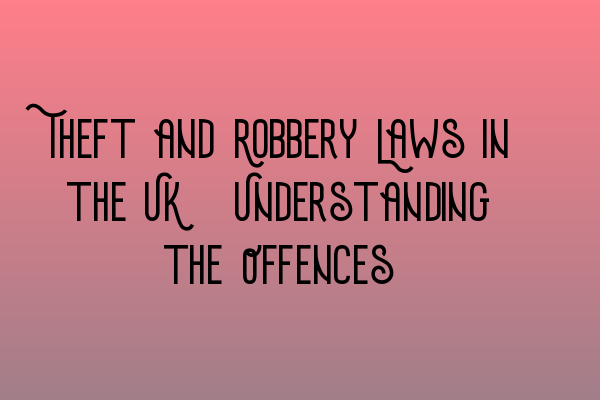Theft and Robbery Laws in the UK: Understanding the Offences
When it comes to criminal acts, theft and robbery are two offences that are often confused with each other. Although both involve taking someone else’s property without permission, they have distinct definitions and legal consequences in the UK. In this blog post, we will delve into the details of theft and robbery, explaining the key differences and outlining the relevant laws.
Understanding Theft
Theft is a criminal offence under the Theft Act 1968 in the UK. It occurs when a person dishonestly appropriates property belonging to another with the intention to permanently deprive the rightful owner of that property. The act of theft can include various situations, such as taking physical items, intellectual property, or even intangible assets like money or confidential information.
For instance, if someone unlawfully takes a mobile phone from another person’s pocket without their knowledge or consent, it would be considered theft. It is important to note that the intention to permanently deprive the owner is a crucial element of theft. If the thief intends to return the property at a later time, it may be classified as a different offence, such as handling stolen goods.
Under the Theft Act 1968, theft is punishable by law, with penalties ranging from fines to imprisonment, depending on the severity of the offence. To learn more about criminal law and practice in the UK, you can explore our SQE 1 Preparation Courses, which cover a wide range of legal topics, including theft and robbery.
Understanding Robbery
Robbery is a more serious offence compared to theft, as it involves theft accompanied by the use of force or the threat of force. It is classified as a specific offence under the Theft Act 1968 and is considered a more aggravated form of theft. Robbery can occur in various settings, such as street muggings, bank robberies, or home invasions.
For example, if someone forcibly snatches a handbag from an individual, causing them physical harm or threatening violence, it would be considered robbery. In this case, the act of theft is accompanied by force or the threat of force, which distinguishes it from a simple theft offence.
The penalties for robbery are significantly more severe than those for theft. If convicted of robbery, the offender may face a lengthy prison sentence. Additionally, the use of force or the threat of force during a robbery can lead to other charges, such as assault or battery.
To prepare for your legal career and understand criminal law in-depth, our SQE 2 Preparation Courses can provide you with comprehensive knowledge and practical insights.
Key Differences between Theft and Robbery
While theft and robbery share similarities in that they involve the unlawful taking of someone else’s property, there are key differences between the two offences:
- Use of Force: Theft does not require the use of force or threat of force, whereas robbery involves the use of force or the threat of force.
- Severity: Robbery is considered a more serious offence than theft due to the involvement of force, which leads to more severe penalties.
- Intent to Permanently Deprive: Theft requires the intent to permanently deprive the owner of the property, whereas robbery focuses more on the act of forcefully taking or attempting to take someone else’s property.
Understanding the differences between theft and robbery is crucial for legal professionals, such as solicitors, who may be involved in defending or prosecuting individuals accused of these offences. It is essential to have a strong grasp of criminal law and practice to navigate the complexities of such cases.
If you are preparing for your legal exams, our SQE 1 Practice Exam Questions and SQE 1 Practice Mocks FLK1 FLK2 can be valuable resources to test your knowledge and boost your confidence.
In conclusion, theft and robbery are distinct criminal offences in the UK. While theft involves the dishonest appropriation of someone else’s property with the intent to permanently deprive the owner, robbery includes the use of force or threat of force during the theft. As legal professionals, it is crucial to understand the nuances of these offences and stay updated on the relevant laws.
For more information on criminal law and practice, explore our comprehensive resources, including our SQE Preparation Courses and the latest SRA SQE Exam Dates.
